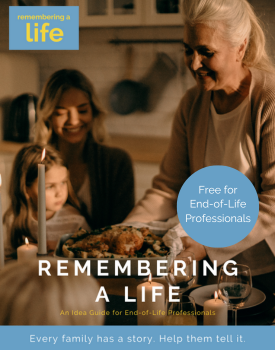Most of us survive a number of death losses over the course of our lives. While every one of our grief experiences will be unique – because every loss is unique – surviving the death of a friend may be one of the most impactful yet publicly overlooked losses we will experience.
Frequently, =losses are categorized based on the means of death, the developmental stage of the survivor, or the nature of the relationship between the survivor and the deceased. There is a bevy of scholarly research, as well as public resources, on almost all of the categories of loss existent in the human condition, but there is a profound and telling absence of public discourse and support for persons who experience the death loss of a friend.
Traditionally, it has been assumed that marital or blood relations of the deceased unequivocally are the people most impacted by a death; therefore, they would be the ones grieving the most strongly and, therefore, are most deserving of attention and support. In recent years, and particularly within younger generations, we are beginning to better understand that kinship ties are not dependent on genetics or marriage, yet we rarely see friends listed as survivors in obituaries or treated as primary grievers at funeral services. Survivors of the death of a friend are still likely to experience disenfranchised grief and face assumptions about the impact of the death loss based on the nature of the relationship.
Friends are the people we choose to go through life with; for many of us, our close friends are essentially our chosen family. Even for those who have strong and healthy relationships within their nuclear family or extended family, the emotional intimacy between friends cannot be replicated or substituted by any other relationship. If you are grieving the death of a friend, it is first important to validate grief as a natural experience following the loss of an important and irreplaceable relationship. There was and will ever be only one relationship exactly like the one you shared with your friend, and your loss of that person deserves recognition and respect.
While each of us undertake different pathways in coming to terms with a loss and moving forward with our grief, the following are some strategies that may assist you in your grief journey following the death of a friend.
Identify trusted outlets for support.
Having support following any death loss can make an enormous difference in how we navigate our grief journey and have healthy outcomes. Being able to identify people in your life – other friends, family members, or colleagues – who can be trusted to be supportive of your grief responses is important. Because there is such a high risk of disenfranchised grief after the loss of a friend, the people to whom you turn for support should be those who will not dismiss the nature of your grief, impose expectations on your feelings or actions based on losses they’ve experienced in their own lives, or in any other way try to police your grief. As with any other type of loss, if you cannot locate the kind of support needed from persons already in your life, consider seeking out a licensed counselor or therapist with demonstrated expertise in grief.
Attempt co-grieving instead of competitive grieving.
When I talk about co-grieving, I am referencing the process of sharing our grief with those who share grief. When we can grieve together over a shared loss, whether within a family system or a friend group, we can better support ourselves while supporting one another. Co-grieving involves validating the different relationship each person had with the individual who died, as well as validating the different emotions, perspectives, and thoughts about the loss that each person will have individually. When co-grieving becomes competitive grieving, everyone involved can be harmed instead of helped; trying to “one up” another person in their grief or jockeying for the status of “best” or “closest” friend can disenfranchise the grief of other members of the group.
Participate in memorialization.
Some people who have experienced the death of a close friend do not communicate their wishes to participate in funeral or memorial services, either because they didn’t wish to impose upon the family of the deceased or because they felt they didn’t have the right to ask to take part in these services. While every family system is unique and complex in terms of dynamics, reaching out to familial grievers and expressing both empathy for their grief and communication of your own grief can open conversations about participation in both formal and informal rituals of mourning. Additionally, within your friend group, there can be many opportunities to memorialize your loved one, from starting a scholarship or community fundraiser in their name, to raising awareness for their cause of death, to group activities as simple and meaningful as scrapbooking photos of memories and events shared within the community of friends.
Carry them with you.
Because our friends are often the family we choose, it is helpful not to think of their role in our lives as concluded following their death. Our relationship is not severed but, rather, changed. By continuing to talk about our friend with others, displaying photos to remind us of happy times together, sharing memories and moments that were meaningful to us, maintaining bonds with them, and appreciating what they brought to our lives, we can carry them with us throughout our years to come.
If you are grieving the death of a friend, understand that you deserve to be validated in your loss and supported as you take steps to resist any disenfranchisement of your grief. Most of all, move forward in your mourning reminded always of the irreplaceable loved shared between you and your friend.

